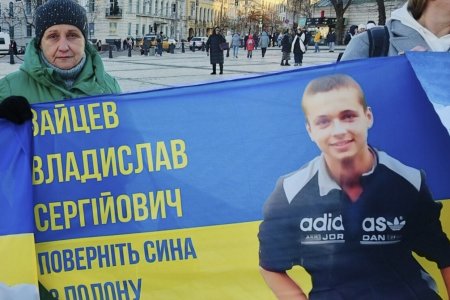
36-year-old Viktor Dzytsiuk remains imprisoned in occupied Donetsk oblast over seven years after he was seized at a checkpoint while taking his wife and daughter to visit his mother. The young man is known to have almost died from the horrific torture he was subjected to in the notorious Izolyatsia secret prison in Donetsk, where men and women were tortured, in part, ‘for fun’.
It is typical of all such abductions that Dzytsiuk’s family received no information about his whereabouts for a very long time. His mother, Halyna, has told the Media Initiative for Human Rights how she would turn up and stand outside the so-called ‘DPR ministry of state security’ building, trying to find out what had happened to her son. She would typically meet many other mothers and wives also desperate for information and also being fobbed off and deceived.
Most of the scant information known about those first years of torment has come from former hostages released during the few major prisoner exchanges.
While Halyna Dzytsiuk was being fobbed off by ‘DPR militants’, her son was being subjected to savage torture – beatings and electric currents attached to sensitive parts of the body and passed through his body. It was Oleksandr Timofeiev, who was with Dzytsiuk at Izolyatsia who recounts that “the lad went grey in a week from the torture. Victor was tortured with electric currents and brutally beaten. He got it worse than anyone. In March 2018, he lost consciousness and was sent to the medical unit in the SIZO” [remand unit].
Dzytsiuk (b. 1988) was living and working in Horlivka, a city near Donetsk within Russia’s proxy ‘Donetsk people’s republic’ [‘DPR’]. He was seized at a militant-controlled checkpoint near Donetsk on 23 November 2017 while driving with his family. An armed man in camouflage gear had approached the car and asked Dzytsiuk to come with him “for a talk”. He was then detained by members of the so-called ‘DPR ministry of state security’, while his wife and daughter were taken back to Donetsk.
This was not quite the standard abduction, since Dzytsiuk was ‘freed’ later that day after a lie detector found nothing. The militants held onto his passport, however, and then ‘invited’ him to come for it nine days later. Victor was seized then, with his wife also interrogated. Victor pleaded for her to be released as she needed to pick up their daughter from kindergarten, but this was ignored. It was only after about eight hours that she was released but prohibited from leaving occupied Donbas with their daughter.
Nothing was found during ‘searches’ of his apartment and car, however the militants decided to treat maps of the area on his telephone as ‘proof’ that he was spying for Ukraine’s Security Service [SBU]. His family told the Media Initiative for Human Rights that the maps were because of Viktor’s work which was involved with the building of roads.
In declaring Viktor Dzytsiuk (b. 1988) a political prisoner, the Memorial Support for Political Prisoners Project mentioned that a weapons charge had also been laid. It is not clear what this refers to, but Russia has added such charges in a number of cases against political prisoners, with these generally based on assertions that something ‘was found’ during a search.
It was from one of the other mothers trying to find out about her son that Halyna Dzytsiuk was told that Viktor might be held at Izolyatsia in Donetsk. Most of the very large number of Ukrainian civilians seized by the militants from mid-2017 through at least 2019 do appear to have been held and tortured at Izolyatsia. Former victims have provided harrowing accounts of the torture which was not only aimed at extracting ‘confessions’, but also a form of ‘entertainment’ for the Russian or Russian-controlled militants.
Dzytsiuk was sentenced in 2020 to 16 years’ imprisonment. This was purportedly for both ‘spying’ and ‘organizing acts of sabotage’. Even if he had a proper lawyer, which is not at all guaranteed, these ‘trials’ were essentially rubberstamping events before kangaroo courts. It was also hoped at the time that once the ‘sentences’ had been passed, that the hostages would be placed at the list for prisoner exchanges and would soon be released.
The last major release, however, took place at the end of December 2019. Then came Russia’s full-scale invasion of Ukraine, and a huge increase in the number of Ukrainian prisoners of war and civilian hostages seized from newly occupied territory. Hostages like Dzytsiuk who had been ‘sentenced’ at a time when Moscow was still pretending that it was a mere ‘observer’, were left with almost no hope of release in the appalling conditions of the Makiivka No. 32 prison colony, which the prisoners’ families were forced to provide with coal or face their loved ones freezing to death.



